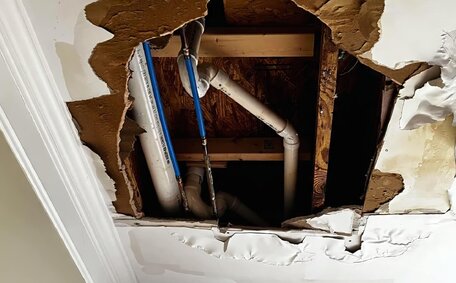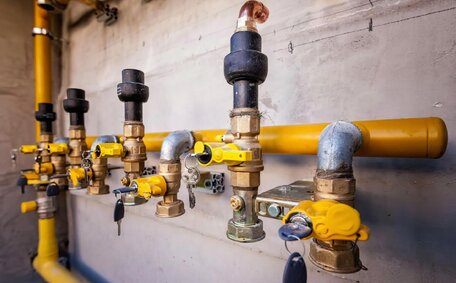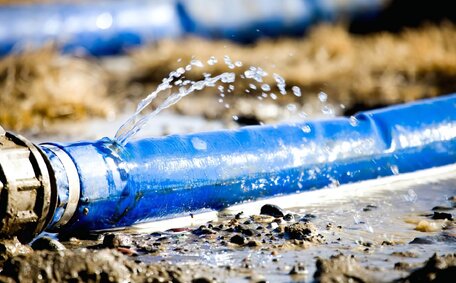Introduction to Common Plumbing Materials
Choosing suitable plumbing fittings and materials is crucial for a functional plumbing system. The pipe options in your home are critical for transporting water for activities like drinking, washing, and waste removal. Selecting the right types of plumbing pipes is essential for efficient water flow, appropriate water pressure, and long-term durability.
There are several key factors to consider when deciding on plumbing materials:
- Application (hot water pipes, cold water, drainage)
- Water type and exposure levels
- Soil conditions and climate
- Cost and availability
- Ease of installation
- Lifespan and maintenance needs
- Local building codes and standards
In this article, the expert plumbers at Lindfield Plumbing provide an overview of the various plumbing pipe types suitable for any home. We will cover the pros and cons of different types of pipes, guiding homeowners in making informed choices for their unique requirements.
Key Factors Influencing Your Choice of Plumbing Pipes
When selecting plumbing pipes for your home, there are several key factors to consider:
- Water Type - The type of water in your area (hard, soft, acidic, etc.) can impact the lifespan of pipes. You’ll want to choose the right type of durable material available.
- Environmental Exposure - Pipes located outdoors or in areas prone to moisture need materials that can handle corrosion and prevent damage.
- Soil Conditions - The surrounding soil chemistry can damage your underground pipes over time. Consider pH and mineral content for the longevity of the pipes in your house.
- Cost - Materials for plumbing vary in upfront expenses and lifetime costs. Find the right balance for your budget, considering the different types suitable for your homes.
- Regional Codes - Local residential building codes likely dictate allowable types pipes. Ensure your chosen pipes comply with local standards.
- Home Layout - The size and design of your home impacts the sizing, routing, joints, valves and other factors in your plumbing.
Assessing these aspects will aid you in choosing the right pipe plumbing tailored to your specific needs. Lindfield Plumbing experts can evaluate your needs and recommend the best products for your bathroom.
Water Type and Characteristics
The mineral content and pH level of your water significantly impacts the performance and longevity of materials used in plumbing. Hard water with high mineral levels can lead to scale buildup and copper can be particularly susceptible to such corrosion over time. Additionally, pipes resistant to acidic water below pH 7, such as PEX and PVC, are less susceptible to corrosion compared to some metals like copper.
To combat such issues, materials can be chosen carefully based on your unique water composition. Compared to rigid copper, pipes such as PEX and PVC with corrosion-resistant fittings may be better suited for hard or acidic water. Moreover, pipes such as stainless steel and brass piping also resist corrosion effectively and can endure harsh water conditions.
To really know your water, testing through a professional lab is the best way to gain clarity on its type and mineral content. From there, Lindfield Plumbing can identify the best plumbing materials for your home’s water supply.
Exposure and Environmental Considerations
External factors like UV exposure, temperature extremes, and soil conditions can significantly impact the lifespan and suitability of different plumbing materials.
PEX pipes, paired with durable fittings, handle UV rays effectively and are suitable for areas with low water pressure, including outdoor or exposed settings. Copper pipes can use added insulation as they may become brittle and fail faster when subjected to freezing winter temperatures, so insulation is crucial in cold climates.
The mineral content and chemistry of soils also wears on underground pipes over time. Acidic, clay-heavy soils can be corrosive to some metals. Professional soil assessment is imperative when choosing materials to ensure your pipe system aligns with environmental conditions and avoids early failure.
Consulting with Lindfield Plumbing experts about local environmental conditions and recommended materials for your area is the best way to choose right plumbing pipes designed for maximum longevity given your home’s unique location and exposures.
Pipe Costs and Longevity
The cost and longevity of the supply line systems your home uses can vary greatly depending on the material. While initial costs of various pipe materials are important, homeowners should also weigh the expected lifespan and potential replacement or repair expenses in the future.
Copper pipes are often used for gas and cold water supply lines, have a higher initial cost but can last 50 years or more, offering long-term cost-effectiveness. The longevity of PEX pipes is estimated to be around 25-30 years. PVC pipes offer a shorter lifespan of only 10-15 years before they may need replacement.
Some materials like galvanised steel pipe are prone to build-up and corrosion issues due their specific material properties that reduce lifespan. Others, like PEX, are also suitable since they require fewer repairs in the long run. Careful choice based on application, water type, and location can save you significantly in the long term on your plumbing investment.
The Lindfield Plumbing team offers expert insights on materials that best match your home’s conditions for cost efficiency and longevity. We consider your whole-of-life costs when advising on the most suitable and cost-effective plumbing materials for your home.
Plumbing Applications For Your Home
Within both residential commercial environments, domestic plumbing pipes serve several key functions – supplying hot and cold water to fixtures, removing wastewater and sewage, and ventilating plumbing systems.
Supply pipes distribute water to home appliances, including tankless water heaters, and fixtures like sinks and showers, ensuring efficient delivery of hot and cold water. These supply pipes are usually used in materials such as copper, PEX, or PVC.
For efficient drainage waste disposal, plumbing often employs larger diameter pipes, such as PVC or steel cast iron, to remove wastewater from fixtures and connect to the main sewer line. Vent pipes, often made of plastic, facilitate airflow to ensure proper drainage.
Understanding each system’s operation for hot cold water allows you to select suitable materials that align with their application. Consult an expert Lindfield plumber to tailor your plumbing pipes to your specific needs and home layout.
Copper Pipes
Copper pipes are the most common type of material used for residential water supply lines. They are corrosion resistant, making them well-suited for potable water delivery and connecting to your water heater.
Some key benefits of copper pipes for various water applications include:
- Ideal for hot cold water supply lines
- Withstand temperatures up to 200°C
- Resist scale build-up from hard water
- Limit bacterial growth compared to other most commonly used plastic pipes
- Durable for 50+ years with minimal repair needs
- Recyclable at the end of lifespan
On the downside, both copper pex pipes have a higher initial cost and can be tricky for DIY homeowners to bend and join during installation. They also need additional UV and freeze protection when used in exposed outdoor settings.
Before deciding on a copper pipe solution, check with Lindfield Plumbing on the suitability for your water supply and home layout. We can advise whether alterations like insulation are needed for optimal performance.
PVC Pipes
PVC (polyvinyl chloride) is a popular type plumbing material used extensively for the drainage system in residential plumbing. Key applications include:
- Bathroom plumbing lines from sinks, tubs, showers
- Main home sewer lines
- Vent stacks
Some advantages of PVC pipes, which are frequently used for drains, include:
- Low cost material
- Easy to install and modify
- Resistant to corrosion and most chemicals
- Minimal buildup or scaling
It’s also important to note that PVC pipes have a shorter lifespan of 10-15 years compared to other materials. However, for cold water supply, this type pipe is suitable and provides a cost-effective option. Cold water under pressure should not exceed 60°C to prevent warping or joint failure.
PVC is a budget-friendly, DIY-friendly option for drainage due to its low cost and easy installation. Consult Lindfield Plumbing to verify if PVC aligns with your home layout and expected longevity based on environmental factors.
PEX Pipes
PEX (crosslinked polyethylene) piping has become a top choice for water supply lines in many residential homes. Key benefits of PEX include:
- Flexibility - Easier routing through walls and tight spaces
- Corrosion resistance - Ideal for most water types, including those used in heating systems
- Withstands moderate water temperatures
- Fewer connections needed compared to rigid piping
- Easy for DIY homeowners to install
A drawback of PEX pipes is their vulnerability to UV light, rendering them unsuitable for outdoor installation or places with direct sunlight. Moreover, PEX can struggle with extremely hot water beyond 180F.
With an expected lifespan of approximately 25-30 years, When seeking cost-effective piping options, PEX stands out as being simple to install, whether by a DIY enthusiast or professionals like Lindfield Plumbing. We can advise if PEX is suitable for your home’s layout and water type.
Galvanized Steel Pipes
These kinds pipes, like galvanised steel, were commonly installed for water supply lines in older homes. They consisted of regular carbon steel coated with a protective zinc layer to resist corrosion. However, over time that coating deteriorates, which can cause internal rusting and restricted water flow.
Due to corrosion issues, galvanised pipes typically only last 20-30 years. They can also pose health risks when corroded particles enter drinking water. As a result, galvanised steel has declined in use for modern plumbing systems.
If your pipes are old and galvanised, you may need to replace your plumbing materials to ensure safe water supply. Copper, PEX, and CPVC tend to be better alternatives for longevity, efficiency, and safety. the expert team at Lindfield Plumbing stays well-informed about the best replacement options to modernise your home plumbing system.
Cast Iron Pipes
Cast iron pipes were historically used for drainage systems in older homes. They are among the most durable, with an expected lifespan exceeding 50 years.
However, cast iron is one most prone to internal corrosion and rust if drainage flow becomes restricted. Rust buildup can end up causing blockages and leaks in steel cast systems. Cast iron’s heavy weight also makes installation labor-intensive.
While repairing existing drainage systems is an option, full replacement with a kind pipe such as PVC or ABS plastic piping may be recommended. New home construction very rarely utilises cast iron today due to the availability of cheaper, lighter, DIY-friendly alternatives.
If your home still relies on old cast iron drains, the expert Lindfield plumbers can inspect the current condition and advise you on either repair strategies or repiping options that may better suit your needs.
Regional Compliance Considerations
Compliance with local building codes and plumbing standards is crucial for installing pipes in your Lindfield, Sydney home.
Australia’s National Construction Code (NCC) sets the minimum requirements and standards for new construction, covering plumbing systems. The NCC aims to ensure safety and health standards are met.
In NSW, all plumbing and drainage work must comply with AS/NZS 3500, which is the national plumbing and drainage standard. Certified plumbers are trained to apply this standard when working on Australian homes plumbing installations.
Key considerations for Lindfield homeowners include:
- Using licenced plumbers who can make AS/NZS 3500 compliant installations
- Ensuring any imported plumbing materials make your home compliant with Australian standards
- Checking pipe materials are certified WaterMark to confirm drinking water safety
- Requesting paperwork to prove compliance with regulations
The Lindfield Plumbing team remains updated on regulations to ensure compliance with local plumbing codes. We source Australian standard materials and can provide the proper compliance paperwork for any installations or replacements we perform.
Adherence to these rigorous regulations ensures your water supply or drainage systems are safe, efficient, and durable, meeting state and national plumbing standards.
Installation and Maintenance Tips
Proper installation is crucial to install your pipes for optimal performance and longevity. Copper and PEX pipe installations require more skill to maneuver fittings and bends, so a professional plumber is recommended unless you’re highly experienced with DIY projects.
Although PVC and ABS pipes are user-friendly, they may not match the lifespan or adaptability of PEX options. But make sure you thoroughly research proper techniques before attempting complex installations yourself.
Annual visual checkups of all visible segments of your pipes can help keep your plumbing system free from leaks, corrosion, or joint complications. Periodic testing of these kinds of internal pipe conditions helps monitor deterioration.
Ensure there no obstructions to access panels or drain plugs for smooth maintenance. Avoid covering pipes with permanent structures.
Protect outdoor pipes from freezing with insulation, heat tape, or heat cables. Prevent water stagnation in pipes that are infrequently used.
Maintaining your drains by cleaning fixtures regularly and using drain strainers prevents buildup and clogging issues over time. Be mindful of what goes down drains.
Annual consultations with Lindfield Plumbing can ensure your plumbing is in top shape and can assist with pipe replacement strategies if needed. We can answer questions or concerns about bathroom renovation, installations, materials or maintenance needs.






